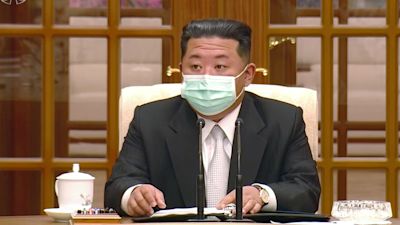Kim Jong Un orders lockdown as North Korea admits outbreak for first time

North Korea has imposed a nationwide lockdown to control its first acknowledged Covid outbreak.
Up until this point, the country has pushed the widely doubted claim that its kept out a virus that has reached nearly every place in the world.
The outbreak forced leader Kim Jong Un to wear a mask in public, likely for the first time since the start of the pandemic, but the scale of transmissions inside North Korea isn't immediately known.
A failure to slow infections could have serious consequences because the country has a poor healthcare system and its 26 million people are believed to be mostly unvaccinated. Some experts say North Korea, by its rare admission of an outbreak, may be seeking outside aid.
However, hours after North Korea confirmed the outbreak, South Korea’s military said it detected the North had fired three suspected ballistic missiles toward the sea.
Want a quick and expert briefing on the biggest news stories? Listen to our latest podcasts to find out What You Need To Know
It was its 16th round of missile launches this year, in brinkmanship aimed at forcing the United States to accept North Korea as a nuclear power and negotiate sanctions relief and other concessions from a position of strength.
The official Korean Central News Agency said tests of virus samples collected on Sunday from an unspecified number of people with fevers in the capital, Pyongyang, confirmed they were infected with the Omicron variant.
At a meeting for the ruling party, Politburo, Kim called for a thorough lockdown of cities and counties and said workplaces should be isolated by units to block the virus from spreading. He urged health workers to step up disinfection efforts at workplaces and homes and mobilise reserve medical supplies.
Kim said it was crucial to control transmissions and eliminate the infection source as fast as possible, while also easing inconveniences to the public caused by the virus controls. He insisted the country will overcome the outbreak because its government and people are “united as one”.
Despite the elevated virus response, Kim ordered officials to push ahead with scheduled construction, agricultural development and other state projects while bolstering the country’s defence posture to avoid any security vacuum.
North Korea’s state TV showed Kim and other senior officials wearing masks as they entered a meeting room, although Kim removed his mask to speak into a set of microphones. Still photos distributed by KNCA showed Kim unmasked and sitting at the head of a table where all other officials remained masked.
South Korea’s Unification Ministry, which handles inter-Korean affairs, couldn’t immediately confirm whether it was the first time state media showed Kim wearing a mask since the start of the pandemic.
Kim has previously spoken to huge crowds without a mask as he praised the country’s earlier pandemic response, and his decision to be seen with a mask could be aimed at raising public vigilance.
North Korea, which has maintained strict anti-virus controls at its borders for more than two years, didn’t provide further details about its new lockdown.
But an Associated Press photographer on the South Korean side of the border saw dozens of people working in fields or walking on footpaths at a North Korean border town - an indication the lockdown doesn’t require people to stay home, or it exempts farm work.
The measures described in state media and Kim’s declaration that economic goals should still be met could indicate that North Korea is focusing more on restricting travel and supplies between regions, analyst Cheong Seong-Chang at South Korea’s Sejong Institute said.
North Korea’s government has shunned vaccines offered by the UN-backed COVAX distribution programme, possibly because they have international monitoring requirements.
Seoul’s Unification Ministry said South Korea is willing to provide medical assistance and other help to North Korea based on humanitarian considerations. Relations between the Koreas have deteriorated since 2019 amid a stalemate in nuclear negotiations and the North’s increasingly provocative weapons tests.
In Beijing, Chinese Foreign Ministry spokesperson Zhao Lijian said Beijing is offering North Korea help in dealing with the outbreak. North Korea has reportedly rejected previous Chinese offers of domestically developed vaccines.
Kim Sin-gon, a professor at Seoul’s Korea University College of Medicine, said North Korea is likely signalling its willingness to receive outside vaccines, but wants many more doses than offered by COVAX to inoculate its entire population multiple times. He said North Korea would also want Covid medicines and medical equipment shipments that are banned by UN sanctions.
North Korea’s previous coronavirus-free claim had been disputed by many foreign experts. But South Korean officials have said North Korea had likely avoided a huge outbreak, in part because it instituted strict virus controls almost from the start of the pandemic.
Early in 2020 - before the coronavirus spread around the world - North Korea took severe steps to keep out the virus and described them as a matter of “national existence.”
It all but halted cross-border traffic and trade for two years, and is even believed to have ordered troops to shoot on sight any trespassers who crossed its borders.
In recent months, some Pacific island nations that kept the virus out by their geographic isolation have recorded outbreaks. Only tiny Tuvalu, with a population around 12,000, has escaped the virus so far, while a few other nations – Nauru, Micronesia and Marshall Islands – have stopped cases at their borders and avoided community outbreaks.